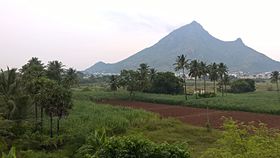Arunachala
| Arunachala | |
|---|---|
| Annamalai | |
 |
|
| Highest point | |
| Elevation | 814 m (2,671 ft) |
| Coordinates | 12°11′N 79°02′E / 12.18°N 79.04°ECoordinates: 12°11′N 79°02′E / 12.18°N 79.04°E |
| Geography | |
| Location | Tiruvannamalai district, Tamil Nadu, India |
Arunachala (IAST: Aruṇācala, "red mountain") refers to the holy hill at Tiruvannamalai in Tamil Nadu. The hill is also known by the names Arunagiri, Annamalai Hill, Arunachalam, Arunai, Sonagiri and Sonachalam.
It is one of the five main shaivite holy places in South India. The Annamalaiyar Temple, a temple of Lord Shiva is located at the base of the hill. Every year in the Tamil month of Karthigai (November-December), the Karthigai Deepam (Light) is lit atop the hill.
It is also an important place for devotees of Sri Ramana Maharshi, with Sri Ramana Ashram situated at its foothills.
According to the legend, associated with the Temple, a dispute occurred between Brahma the creator, and Vishnu the preserver, over which of them was superior. In order to settle the argument, Lord Shiva is said to have manifested as a column of light, and then the form of Arunachala.
In the Maheswara Khanda of Skanda Purana, sage Veda Vyasa describes in great detail the wonder of Arunachala.
Over the centuries, many saints and sages have been drawn to Arunachala. The Saivite saints Manickavachagar, Appar, Sambandar and Sundarar are four examples. In the fifteenth century, Guhai Namasivaya, Guru Namasivaya and Virupaksha Deva came from Karnataka and settled on Arunachala. Saint Namasivaya lived in one of Arunachala's caves which is still known by his name. Virupaksha Deva lived in an OM-shaped cave higher up on the Hill, and this cave too still bears his name. Located on the south-east slope of Arunachala, this was the cave that Sri Ramana Maharshi lived in from 1899 to 1916.
...
Wikipedia

